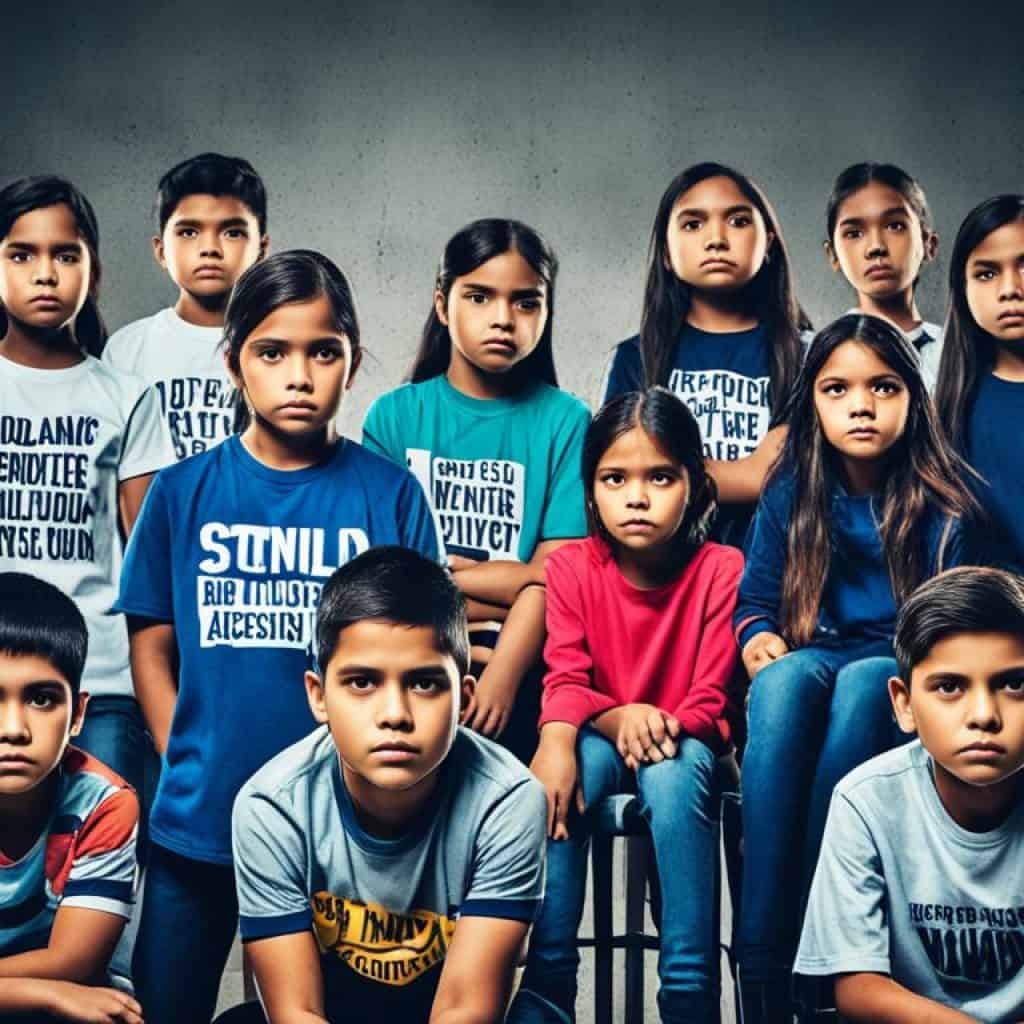Did you know that seven out of ten Filipino students have experienced bullying? Bullying is a pervasive problem in the Philippines, with detrimental effects on the mental health and well-being of individuals. But how can we prevent and address bullying in our communities?
In this comprehensive guide, we delve into the world of bullying in the Philippines, exploring its various forms and impacts. We’ll also discuss the importance of anti-bullying programs, the role of legislation, and the need for proactive measures to create a safer and kinder society for all.
Key Takeaways:
- Bullying is a prevalent issue in the Philippines, with seven out of ten students being affected.
- Bullying can have severe consequences on the mental health and well-being of individuals.
- Anti-bullying programs and legislation play a crucial role in addressing and preventing bullying incidents.
- Creating a supportive and empathetic environment is essential in combating bullying.
- By understanding the nature and impact of bullying, we can take proactive measures to create safer communities.
What is Bullying?
Bullying is a form of aggressive behavior that involves the repeated and intentional use of power to harm or control another person who is perceived as weaker or vulnerable. It can occur in various settings such as schools, workplaces, or online platforms. The effects of bullying can be severe, leading to emotional distress, low self-esteem, academic problems, and even self-harm or suicidal thoughts.
It is important to address and prevent bullying through awareness, education, and creating supportive environments. By understanding the nature of bullying and its impact, we can work towards creating safer and kinder communities, both online and offline.
- Verbal Bullying: This involves using words to tease, insult, or humiliate the victim.
- Social Bullying: This includes excluding, gossiping, or spreading rumors about the victim.
- Physical Bullying: This involves physically hurting or threatening the victim.
- Cyberbullying: This occurs online, through the use of social media, messaging apps, or other digital platforms.
It is important to take bullying seriously and provide support to those who have experienced it. By promoting empathy, respect, and kindness, we can create a culture that rejects bullying behavior and fosters a sense of belonging for all individuals.
Examples of Bullying
Bullying can take on various forms, each with its own set of harmful consequences. Whether it’s in person or online, the impact of bullying is far-reaching and can leave lasting emotional scars on victims.
Verbal Bullying
Verbal bullying involves the use of hurtful language, demeaning comments, teasing, or name-calling to belittle and humiliate others. It can happen in school, workplaces, or even within social circles. Here are a few examples of verbal bullying:
“You’re so stupid, nobody likes you.”
“You’ll never amount to anything in life.”
“Why don’t you just go away? Nobody wants you here.”
Social Bullying
Social bullying focuses on excluding or isolating individuals from a group, spreading rumors, or damaging their reputation. It can be a subtle and manipulative form of bullying that aims to undermine a person’s social standing. Here are some examples of social bullying:
Spreading false rumors about someone to turn others against them.
Purposely excluding someone from group activities or conversations.
Creating a social media campaign to publicly shame and humiliate an individual.
Cyberbullying
In today’s digital age, cyberbullying has become a prevalent form of harassment. It involves using electronic devices or online platforms to intimidate, threaten, or harm others. Here are a few examples of cyberbullying:
Sending malicious or threatening messages through email, social media, or messaging apps.
Posting humiliating photos or videos of someone without their consent.
Creating fake profiles to impersonate and defame others online.
Bullying in any form is unacceptable and can have detrimental effects on the well-being and self-esteem of individuals. It’s important to recognize these examples of bullying and take a stand against such behavior.
| Type of Bullying | Examples |
|---|---|
| Verbal Bullying | Teasing, name-calling, hurtful comments |
| Social Bullying | Exclusion, spreading rumors, damaging reputation |
| Cyberbullying | Malicious messages, public humiliation, fake profiles |
Remember, it’s essential to foster a culture of kindness and empathy, both online and offline, to eradicate bullying and create a safe environment for everyone.
Bullying in Tagalog
In the Filipino language, there is no direct translation for the word “bullying.” However, there are terms that describe different aspects of bullying such as pananakot (intimidation), pananakit (hurting others), pang-aapi (oppression), and pang-aasar (teasing). Understanding these nuances in the Filipino language can help in addressing and raising awareness about bullying in the Philippines.
For example, while the term “bullying” may not exist in Tagalog, the concept and behaviors associated with bullying can be expressed through these descriptive words. Pananakot encompasses the intentional act of instilling fear or intimidation in others. Pananakit refers to physically hurting someone or causing harm, while pang-aapi covers the broader idea of oppressing or mistreating others. Lastly, pang-aasar involves teasing, taunting, and engaging in hurtful or annoying behavior towards others.
By familiarizing ourselves with these Tagalog terms, we can better communicate and address the various dimensions of bullying in the Filipino community. It enables us to have meaningful discussions, educate others, and implement effective strategies to prevent and combat bullying in the Philippines.
Bullying Isn’t Cool
In order to combat bullying, it is essential for parents, teachers, and the community to take proactive measures. By implementing impactful anti-bullying programs and educating children about empathy, respect, and kindness, we can foster a culture that rejects bullying behavior.
Support should be provided not only to the victims but also to the bullies themselves. It is crucial to help them understand the consequences of their actions and guide them towards more positive behaviors. With the right support and intervention, bullies can learn empathy and develop healthier ways of interacting with others.
Teaching children about the importance of standing up against bullying and promoting inclusivity will lay the foundation for a safe and supportive environment. By empowering bystanders to intervene and report instances of bullying, we can create a community where everyone feels protected and valued.
Let’s work together to make bullying prevention a priority. By investing in anti-bullying programs and fostering a culture of respect and kindness, we can create lasting change and ensure the well-being of all individuals.
Key Strategies for Bullying Prevention
- Educate children about empathy and kindness
- Promote inclusive behaviors and celebrate diversity
- Implement proactive anti-bullying policies in schools
- Train teachers and staff to recognize and address bullying
- Create a safe reporting system for students
- Encourage bystander intervention
- Provide counseling and support for victims
- Offer guidance and therapy for bullies
| Benefits of Bullying Prevention Programs | Impact |
|---|---|
| Reduces rates of bullying | Creates a safe and inclusive environment |
| Fosters empathy and respect | Improves mental health and well-being |
| Enhances academic performance | Reduces absenteeism and dropout rates |
| Builds positive social skills | Prevents long-term psychological harm |
“Bullying isn’t cool. Let’s stand together against bullying and create a kinder, more inclusive world.”
Bullying Laws
In the Philippines, addressing and preventing bullying is a top priority. The country has enacted the Anti-Bullying Act of 2013, which mandates that all elementary and secondary schools adopt an anti-bullying policy. The law provides clear guidelines for reporting and addressing incidents of bullying, ensuring that schools take proactive measures to create a safe and inclusive environment for students.
The Anti-Bullying Act of 2013 emphasizes the importance of preventing bullying in educational institutions. By implementing effective anti-bullying policies and procedures, schools can protect their students from the harmful effects of bullying and promote a culture of respect and empathy.
“Bullying is a serious issue that affects the well-being of our students. By enforcing the Anti-Bullying Act, we can ensure that schools provide a safe and nurturing environment for all students to thrive.”
The law requires schools to have mechanisms in place for reporting incidents of bullying, conducting investigations, and applying appropriate disciplinary actions. By enforcing these laws, schools can hold bullies accountable for their actions and provide support to both victims and perpetrators.
“The implementation of bullying laws is crucial in fostering a safe and supportive learning environment. By enforcing policies and providing resources, we empower students to speak up against bullying and seek help when needed.”
Moreover, the government plays a key role in enforcing anti-bullying laws and ensuring the safety and well-being of students. By collaborating with educational institutions and raising awareness about bullying laws, the government can create a cohesive approach in addressing and preventing bullying.
To summarize, the Anti-Bullying Act of 2013 in the Philippines mandates schools to adopt anti-bullying policies and procedures. By enforcing these laws, schools and the government can create a safer and more inclusive environment for students, while sending a strong message that bullying will not be tolerated in educational institutions.

| Key Points | Benefits of Bullying Laws |
|---|---|
| Promoting a safe and inclusive learning environment | Ensuring the well-being of students |
| Providing clear guidelines for reporting and addressing bullying incidents | Creating accountability for bullies |
| Empowering students to speak up against bullying | Reducing the prevalence of bullying in schools |
| Supporting victims and perpetrators | Fostering a culture of respect and empathy |
Bullying Impact on Mental Health
Bullying can have severe consequences on the mental health of individuals, leading to increased levels of anxiety, depression, low self-esteem, and even suicidal thoughts. The relentless harassment and emotional abuse experienced by victims can result in long-lasting psychological effects that require professional support to overcome. It is crucial that we recognize the profound impact bullying has on mental well-being and take proactive measures to address this issue.
Mental health services play a vital role in supporting victims of bullying. Access to counseling, therapy, and other forms of psychological intervention can help individuals process their experiences, rebuild their self-esteem, and develop effective coping strategies. By providing comprehensive mental health support, we empower victims to navigate the emotional aftermath of bullying and regain control over their lives.
Additionally, creating a supportive environment is crucial in mitigating the negative effects of bullying on mental health. Schools, workplaces, and communities must foster a culture of empathy, inclusion, and respect, leaving no room for bullying to thrive. Building strong social connections, promoting positive relationships, and encouraging open communication can help combat the isolation and loneliness often experienced by victims.
It is important to remember that the impact of bullying extends far beyond the immediate emotional pain. Long-term psychological damage can disrupt educational attainment, hinder career progression, and have detrimental effects on overall well-being. By prioritizing mental health support and creating a nurturing environment, we can protect individuals from the devastating consequences of bullying on their mental well-being.
Effects of Bullying on Mental Health
The effects of bullying on mental health are wide-ranging and can manifest in various ways:
- Increased levels of anxiety and fear
- Depression and feelings of sadness
- Low self-esteem and self-worth
- Social isolation and loneliness
- Difficulty concentrating and academic decline
- Disrupted sleep patterns and insomnia
- Eating disorders and body image issues
- Self-harm or engaging in risky behaviors
- Suicidal thoughts and attempts
Providing Mental Health Support
Ensuring access to comprehensive mental health resources is essential in addressing the negative impact of bullying. Some key strategies include:
- Implementing school-based mental health programs that educate students, teachers, and parents about the effects of bullying on mental well-being.
- Training professionals in schools and communities to recognize the signs of bullying and provide appropriate support and intervention.
- Incorporating mental health education into the curriculum, promoting emotional intelligence and empathy among students.
- Establishing partnerships with mental health organizations to offer counseling services, therapy, and support groups specifically tailored to victims of bullying.
| Benefits of Mental Health Support for Bullying Victims | Approaches to Mental Health Support |
|---|---|
| 1. Improved emotional well-being and resilience | 1. Individual counseling |
| 2. Enhanced self-confidence and self-esteem | 2. Group therapy |
| 3. Development of effective coping mechanisms | 3. Family counseling |
| 4. Increased social support and sense of belonging | 4. Trauma-focused therapy |
| 5. Reduction in symptoms of anxiety and depression | 5. Peer support programs |
Creating a Supportive Environment
Building a supportive environment is crucial in preventing and addressing the detrimental impact of bullying on mental health. Some effective strategies include:
- Fostering a culture of empathy, respect, and inclusion where bullying is not tolerated.
- Encouraging the reporting of bullying incidents and ensuring swift and appropriate action is taken.
- Implementing comprehensive anti-bullying policies and programs that educate students about the importance of kindness and acceptance.
- Organizing awareness campaigns and workshops to empower students, parents, and educators in recognizing and addressing bullying.
- Facilitating peer support systems and mentoring programs to create a network of support for victims.
By prioritizing mental health support and creating nurturing environments, we can protect individuals from the devastating consequences of bullying on their mental well-being. Together, let us stand against bullying and work towards a healthier and more inclusive society.
Bullying Cases in the Philippines
Studies indicate that more than 65% of Filipino students have experienced bullying, either in school or online. The Philippines ranks first among 70 countries in terms of the number of reported bullying cases, highlighting the urgent need for action. Bullying has become a pervasive issue that affects the well-being and mental health of individuals across the country.
These distressing statistics underscore the importance of raising awareness about bullying cases in the Philippines. By shedding light on the prevalence and severity of the issue, we can mobilize efforts to implement effective strategies for prevention, intervention, and support. It is crucial to work together as a community to address and combat bullying, ensuring the safety and emotional well-being of our students.
Bullying not only leaves lasting emotional scars on its victims but also affects their academic performance, social integration, and overall sense of security. We must prioritize the development and implementation of comprehensive anti-bullying programs that foster empathy, respect, and inclusivity within educational institutions and online spaces.
“Bullying affects not just the individuals directly involved but also the broader community. It is a societal issue that requires collective action and a commitment to creating a culture of kindness and acceptance.”
Creating safe environments where students can thrive without the fear of bullying is a shared responsibility. Together, we can advocate for stricter enforcement of existing bullying laws and the implementation of proactive measures to identify and address bullying cases promptly.
The Impact of Bullying on Victims
The consequences of bullying are far-reaching and can have devastating effects on the mental health of victims. Individuals who experience bullying are more likely to develop anxiety, depression, and other psychological issues. It is critical to provide victims with the necessary support networks and resources to help them recover from the trauma and rebuild self-esteem.
Furthermore, it is crucial to educate students, educators, and parents on the signs of bullying and how to intervene effectively. Open dialogues, empathy-building workshops, and mental health awareness campaigns can play a significant role in fostering a culture of respect and empathy.

In conclusion, the high prevalence of bullying cases in the Philippines necessitates immediate action. By raising awareness, implementing comprehensive anti-bullying programs, and fostering a supportive and inclusive environment, we can create a society where every individual feels safe, respected, and valued.
Anti-Bullying Legislation Worldwide
Countries around the world are taking a stand against bullying by implementing comprehensive anti-bullying legislation. These laws aim to create safe and inclusive environments in schools and communities, protecting individuals from the harmful effects of bullying. Among the countries that have enacted such legislation are the United States, Canada, and the Philippines.
Anti-bullying laws play a crucial role in addressing and preventing bullying behavior. They establish guidelines for reporting incidents, define the responsibilities of schools and authorities, and provide consequences for perpetrators. By holding individuals accountable for their actions, these laws send a clear message that bullying will not be tolerated.
One area of focus within anti-bullying legislation is the prevention of cyberbullying. With the rise of digital platforms, cyberbullying has become an increasingly prevalent issue. Through these laws, governments aim to address the unique challenges posed by online bullying, ensuring that individuals are protected both offline and online.
Impact of Anti-Bullying Legislation
Anti-bullying legislation has had a significant impact in creating safer environments for students. Studies have shown a decrease in bullying incidents in schools that have implemented comprehensive anti-bullying programs following the enactment of these laws. Furthermore, students who are aware of their rights and the consequences of bullying are more likely to report incidents, allowing for timely intervention and support.
“Anti-bullying legislation sends a strong message that bullying behavior is unacceptable and will not be tolerated. By addressing this issue at a legal level, we are taking active steps towards creating a society where everyone can thrive without fear of bullying.”
To further illustrate the impact of anti-bullying legislation, the table below provides a comparison of key aspects of anti-bullying laws in the United States, Canada, and the Philippines:
**Table: Comparison of Anti-Bullying Legislation**
| Aspect | United States | Canada | Philippines |
|———————|———————————|———————————-|——————————-|
| Definition of Bullying | Includes verbal, physical, and cyberbullying | Encompasses verbal, social, cyber, and text bullying | Covers physical, social, and cyberbullying |
| Reporting Procedures | Mandates that schools establish reporting mechanisms for bullying incidents | Requires schools to have reporting policies and procedures in place | Schools are required to maintain a system for reporting bullying |
| Disciplinary Actions | Provides guidelines for disciplinary actions against bullies, including suspension and expulsion | Allows schools to impose various disciplinary actions, such as suspension, counseling, or restorative measures | Outlines appropriate disciplinary actions for bullying, including counseling and community service |
| Support for Victims | Advocates for school personnel to support victims and provide appropriate assistance | Directs schools to develop support plans for victims, including counseling and academic support | Mandates schools to provide support services, such as counseling and intervention programs |
| Cyberbullying Guidelines | Addresses the issue of cyberbullying specifically and provides guidelines for preventing and addressing it | Recognizes the impact of cyberbullying and incorporates it into anti-bullying policies | Offers provisions to address cyberbullying and promote responsible online behavior |
By enacting anti-bullying legislation, countries are taking a proactive approach to address the issue of bullying. These laws provide a framework for prevention, intervention, and support, ensuring that individuals can thrive in safe and inclusive environments. However, it is important to continue raising awareness and implementing effective anti-bullying measures to create lasting change and eliminate bullying in all its forms.
Perception of Pupils Towards Bullying Prevention
A recent study conducted in the Philippines revealed that students have a remarkably positive attitude towards bullying prevention. They expressed satisfaction with the implementation of anti-bullying measures, indicating a growing awareness and support for initiatives aimed at preventing bullying within the country’s education system.
These findings are encouraging and highlight the effectiveness of ongoing efforts in creating a safer and more inclusive environment for students. It is clear that the measures implemented thus far have made a positive impact on the perception of pupils towards bullying prevention.
To continue fostering this positive perception and further enhance bullying prevention efforts, it is essential to maintain a strong emphasis on promoting awareness and providing necessary resources. By doing so, we can empower students, educators, and the community at large to actively participate in creating a culture that rejects bullying behavior.
By consistently reinforcing the values of empathy, respect, and kindness, we can instill a sense of responsibility and accountability, ensuring that every student feels safe, supported, and valued in their educational journey.

Key Takeaways
- Students in the Philippines have a positive attitude towards bullying prevention measures.
- There is a growing awareness and support for initiatives aimed at preventing bullying in the country’s education system.
- Continued promotion of awareness and provision of resources are crucial to enhance bullying prevention efforts.
- Emphasizing empathy, respect, and kindness can create a culture that rejects bullying behavior.
- Every student should feel safe, supported, and valued in their educational journey.
Conclusion
Bullying is a significant issue that affects individuals in the Philippines, with a high prevalence of bullying cases reported. The impact of bullying can be severe and long-lasting, leading to emotional distress, low self-esteem, and even mental health issues. However, there is hope in our collective efforts to prevent and address bullying.
Through education and awareness, we can equip individuals with the knowledge and tools to recognize and respond to bullying behavior. By implementing effective anti-bullying programs in schools and communities, we can create a safer and more inclusive environment for everyone. It is crucial for parents, teachers, and the community to come together, working hand in hand to address and prevent bullying.
Legislation, such as the Anti-Bullying Act of 2013 in the Philippines, provides guidelines and support for schools and institutions to combat bullying. By enforcing these laws, we can hold perpetrators accountable for their actions and ensure the well-being and mental health of all individuals.
Together, we can make a difference and say no to bullying. Let us continue raising awareness, promoting kindness, and fostering a culture of respect and empathy. By standing up against bullying, we create a brighter future for ourselves and future generations.


















Add comment